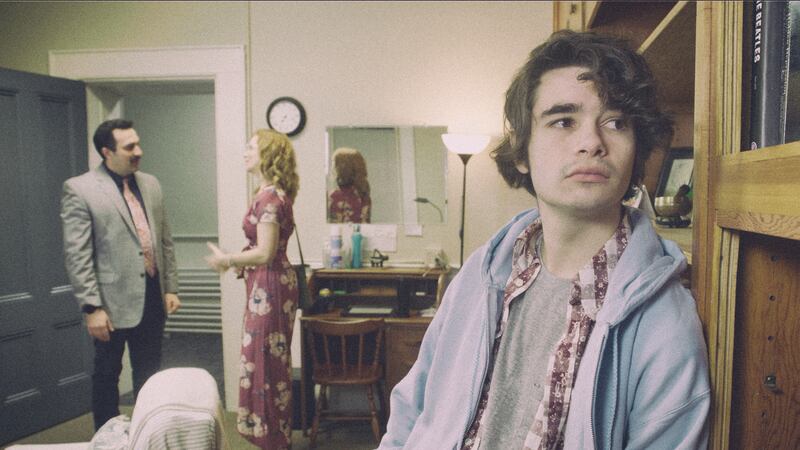Growing up, an odyssey through a physical and emotional minefield of changes, accumulates into an explosion of self-actualization. So goes the metaphor behind the title of screenwriter and co-director Monty Wolfe’s film The Exploding Boy (Wolfe says he had hoped to feature The Cure’s 1985 song by the same name in the film, but limited funding prevented him from obtaining the license).
The Exploding Boy, last year’s winner for Best Dramatic Feature at the Oregon Independent Film Festival, follows Alex Silvers (Parris Bates), a queer teenager isolated by lack of friends and a tense home environment. His only reprieve is his puppets, each named and cast in his shows. Only when a new student arrives at Alex’s school and tears open his world does he share his dream of becoming the next Jim Henson.
Shortly after graduating from Portland State University’s film school in 2020, Wolfe began editing a dramatic romance he wrote about a teenager struggling with drug use, a process that inadvertently birthed a romantic comedy with a different plot and set of characters, The Exploding Boy. The filmmaker said the solitude of early pandemic life drove him to write a story about loneliness and need for community, core themes of the film.
“The biggest thing that inspired [the film] was being in lockdown in COVID,” he tells WW. “When I was cut off from people, I realized how important they were.”
While Wolfe and co-director Ian Southworth had planned to complete filming within three months, the process ultimately stretched across a year and a half (except for two scenes shot in Vancouver, Wash., the movie was shot in Portland). Wolfe says pandemic restrictions complicated filming; without insurance, the crew could not gain approval to film in a school and instead rented a hotel conference room for classroom scenes.
Wolfe also contracted COVID-19 during filming, as did two other crew and cast members soon after. Production paused for several weeks, resuming in the rainy Portland winter when outdoor scenes became difficult. “I thought we’d never see the end of [filming],” Wolfe says.
Editing took eight weeks, but afterward Wolfe accidentally deleted the project’s master file while sending different formats of the film to distributors. He used an HD copy of the film to help rebuild the video timeline, which led to him rearranging, cutting and reincorporating scenes in the movie. While he submitted the film’s original version to festivals, streaming services received the final cut, which Wolfe says is a “far better film.”
Deleting the master file was “the stupidest thing I’ve ever done in my life,” he says. “But in the end, it really benefited the film.”
Bates won Best Actor for his lead role at the Oregon Independent Film Festival. Wolfe says he first contacted the actor after seeing him in the student short Fencesitters, a comedy about a group of 20-somethings attempting to break a friend out of rehab. “[Bates] had the proper emotional range to play a moody angsty teenager,” Wolfe says.
Wolfe says Alex’s passion for puppetry stems from his own love for the Muppets as a child. As a 6-year-old, Wolfe attended a production of Sesame Street Live! and became fascinated by how puppets worked. In The Exploding Boy, puppets allow Alex to create a world he can control and understand.
Currently, Wolfe is working on a “queer noir” about a college graduate searching for meaning in life. He says the comedy will satirize the film noir genre “through a queer lens.”
Wolfe, a gay writer raised in rural Louisiana (he currently lives in Portland), commits to exploring LGBTQ themes in his work. “I absolutely do not write straight stories [for film],” he says. “They had their chance for a hundred years.”
SEE IT: The Exploding Boy, not rated, is available on Amazon Prime Video.
